Homemade Cucumber Dill Pickles - a delicious addition to your kitchen. With this recipe, I will show you how easy it is to make your own at home. A balanced mix of vinegar, sugar, spices and dill produces a mild, slightly sweet pickle. You will find many ways to use these crunchy, tangy Dill Pickles.
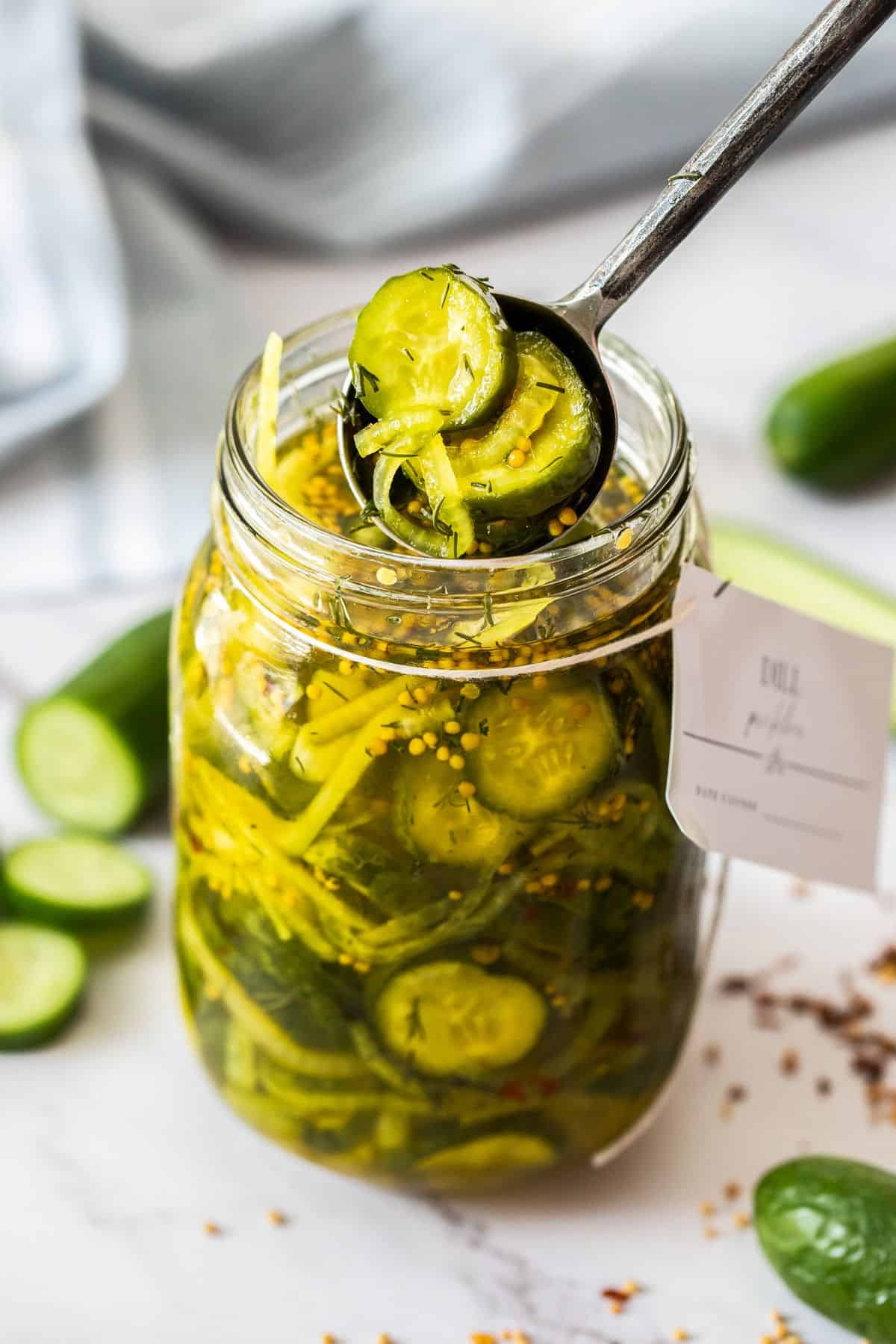
Why you'll love this recipe:
When cucumbers are abundant at the height of their season, I like to make the most of the produce, and my Cucumber Dill Pickles are a favourite.
There are so many ways to use this versatile condiment. I like to use the Homemade Dill Pickles on hamburgers, with cold roast meats or with bread and cheese. As well, the tang of the pickles perfectly complements the richness of salmon or adds zing to almost any sandwich.
You will love these Cucumber Dill Pickles because:
- The pickles are easily made from ingredients that are readily available.
- You will have the satisfaction of knowing that you have made them yourself and know exactly what they contain.
- It is the perfect way to preserve an ingredient at the height of the season and enjoy it throughout the months ahead.
- You will find many ways in which to use these pickles.
- They make a great edible gift.
Ingredients in this recipe:
Please see the recipe card further along in the post for exact quantities of ingredients and the full method.
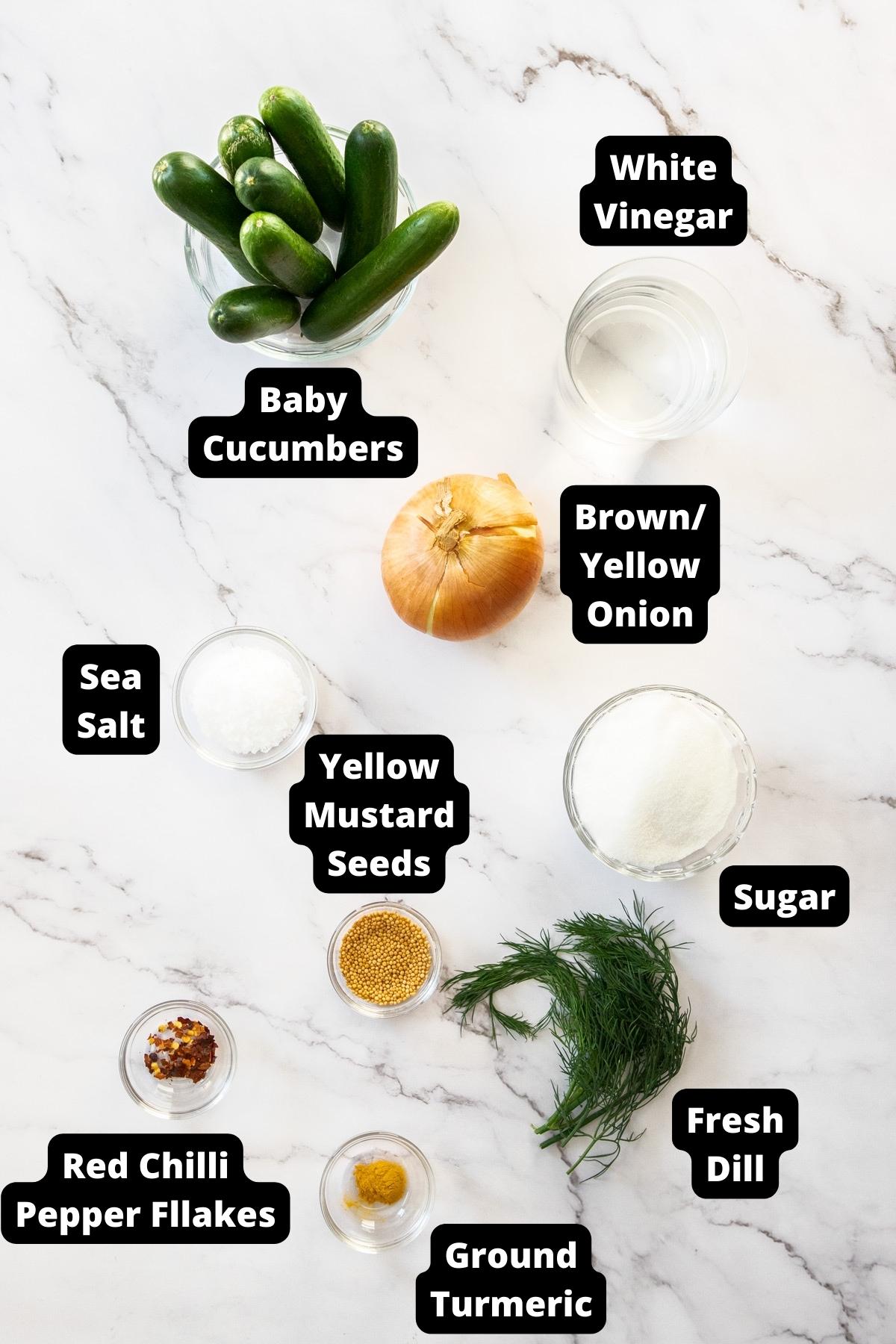
Baby cucumbers - we use Lebanese cucumbers, also known as Persian cucumbers. They are a small variety with thin, edible skin and few seeds. They are crisp and sweet. Look for cucumbers with firm, unblemished skin and avoid any cucumbers which feel soft. We also use these cucumbers in our Bread and Butter Pickles and Spicy Cucumber Pickles.
Brown/yellow onion - this is an all-purpose onion, that adds great flavour to the pickles. You can use a white onion if you prefer.
Salt - we use coarse kitchen salt to make a brine which helps remove moisture from the cucumbers. Table salt is not suitable as it is finer and stronger.
White vinegar - for pickling, we use white vinegar with an acidity of 5%, but you can use white wine vinegar or apple cider vinegar if you prefer.
White sugar - we use regular granulated white sugar to balance the acidity of the vinegar.
Dill - fresh dill leaves are an essential ingredient to add flavour.
Mustard seeds - I have used yellow mustard seeds to add bright, tangy flavour to the pickles.
Turmeric - a small amount of ground turmeric adds colour.
Dried red chilli pepper flakes - add spice to the Dill Pickles.
How To Make Homemade Dill Pickles:
Please see the recipe card further along in the post for exact quantities of ingredients and the full method.
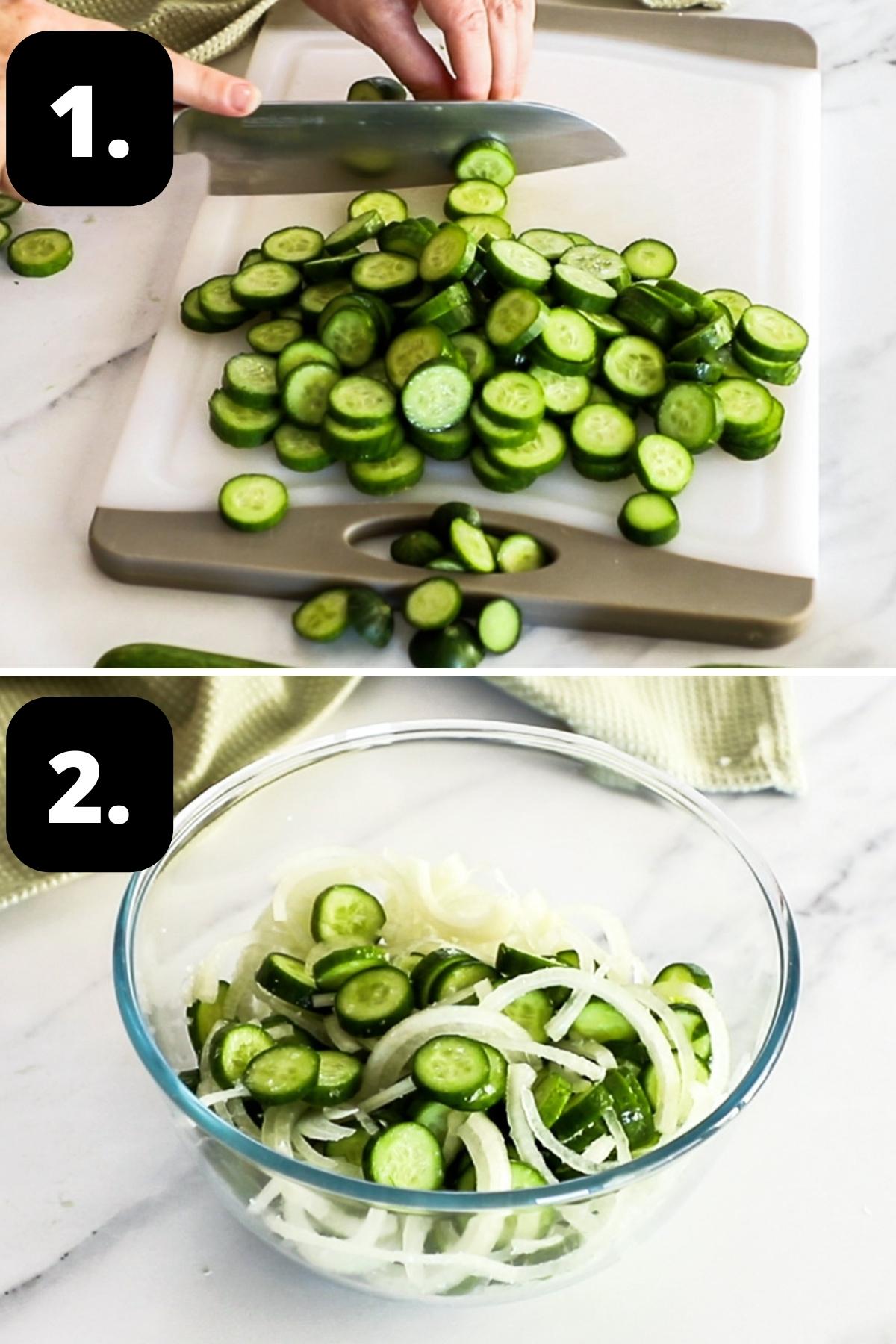
1 - Slice the cucumbers and onions:
Start by sterilising your jar or jars (see how to do this below). Keep them warm.
Wash and dry the cucumbers. Remove both ends. Cut into slices approximately ½ cm (⅕ inch) thick. Peel the onion and cut it in half before thinly slicing each half into half-moons.
2 - Add them to a bowl:
To a medium size bowl, add the cucumbers, onion and salt. Cover the bowl with clingfilm and refrigerate for 4 hours.
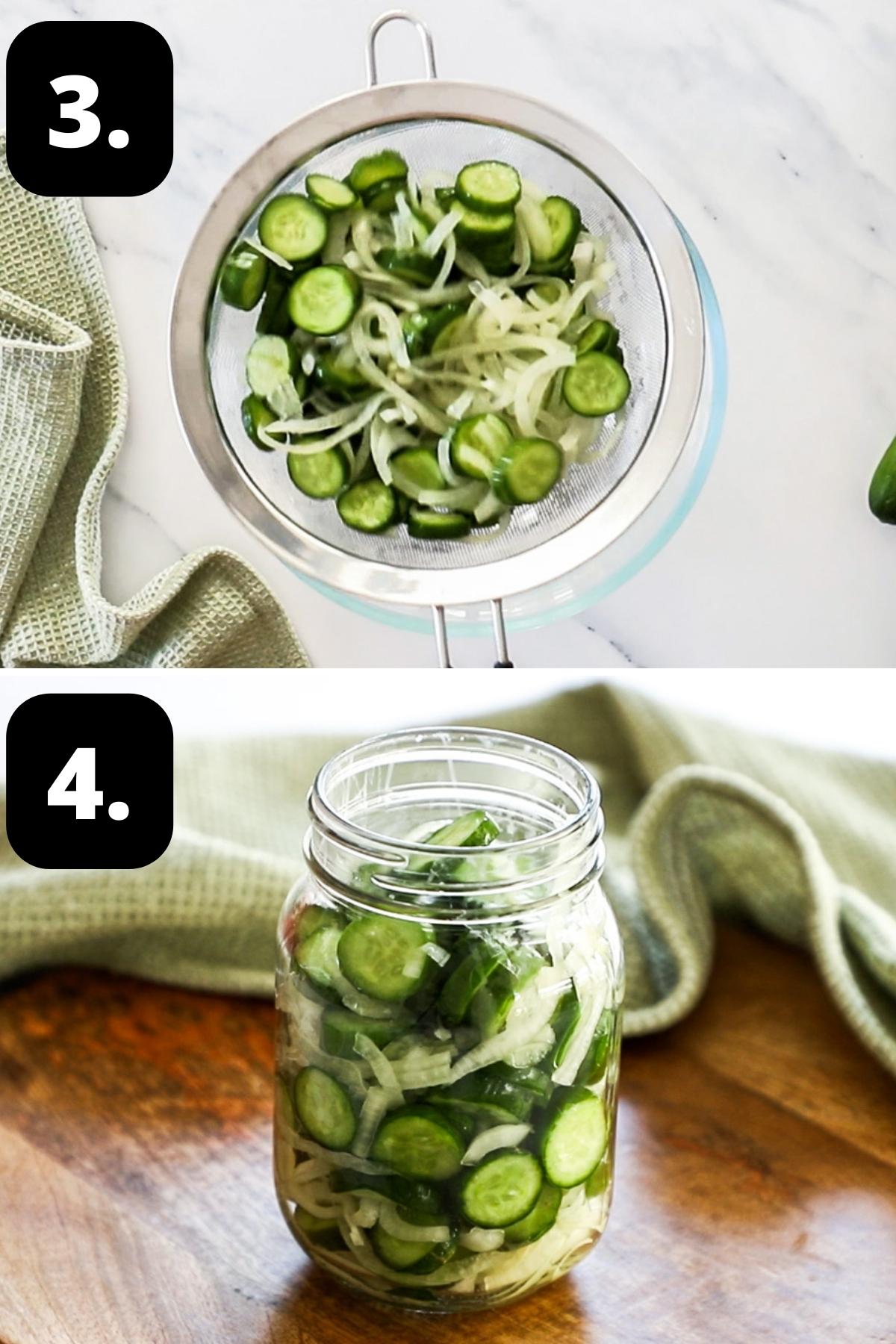
3 - Drain the cucumbers and onions:
Tip the cucumbers and onions into a colander and drain the excess liquid.
4 - Add to a jar:
Add the cucumber, onion and fresh dill to the warm sterilised jar.
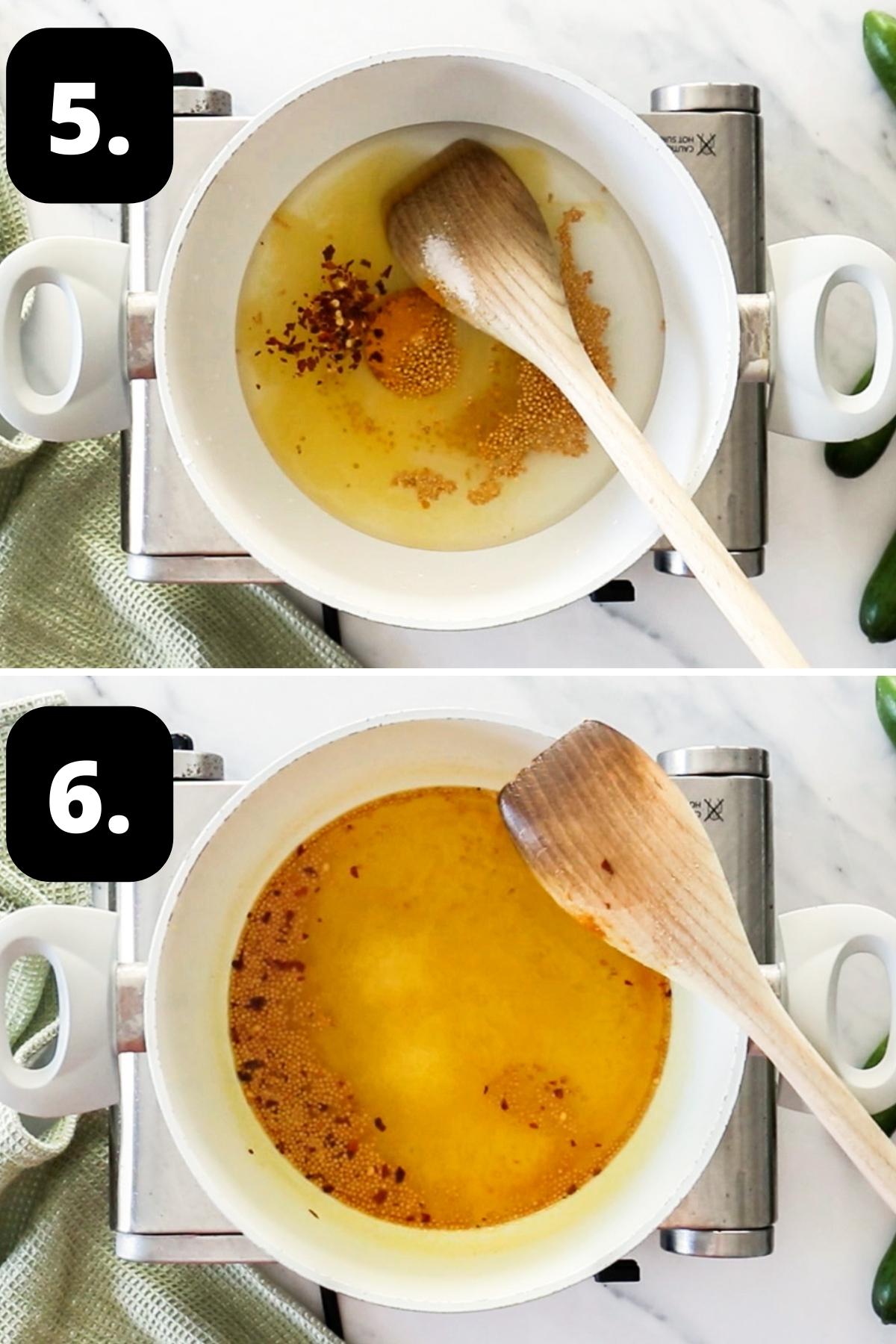
5 - Prepare the pickle brine:
In a non-reactive pan, add the vinegar, sugar and seasonings, except for the dill. On a medium heat, stir to dissolve the sugar. (Details regarding non-reactive pans are included in the recipe below).
Once dissolved, simmer for 3 minutes.
6 - Add to the jar:
Add the vinegar mixture to the jar with the cucumbers. Seal the jars immediately and allow them to cool on the bench before refrigerating.
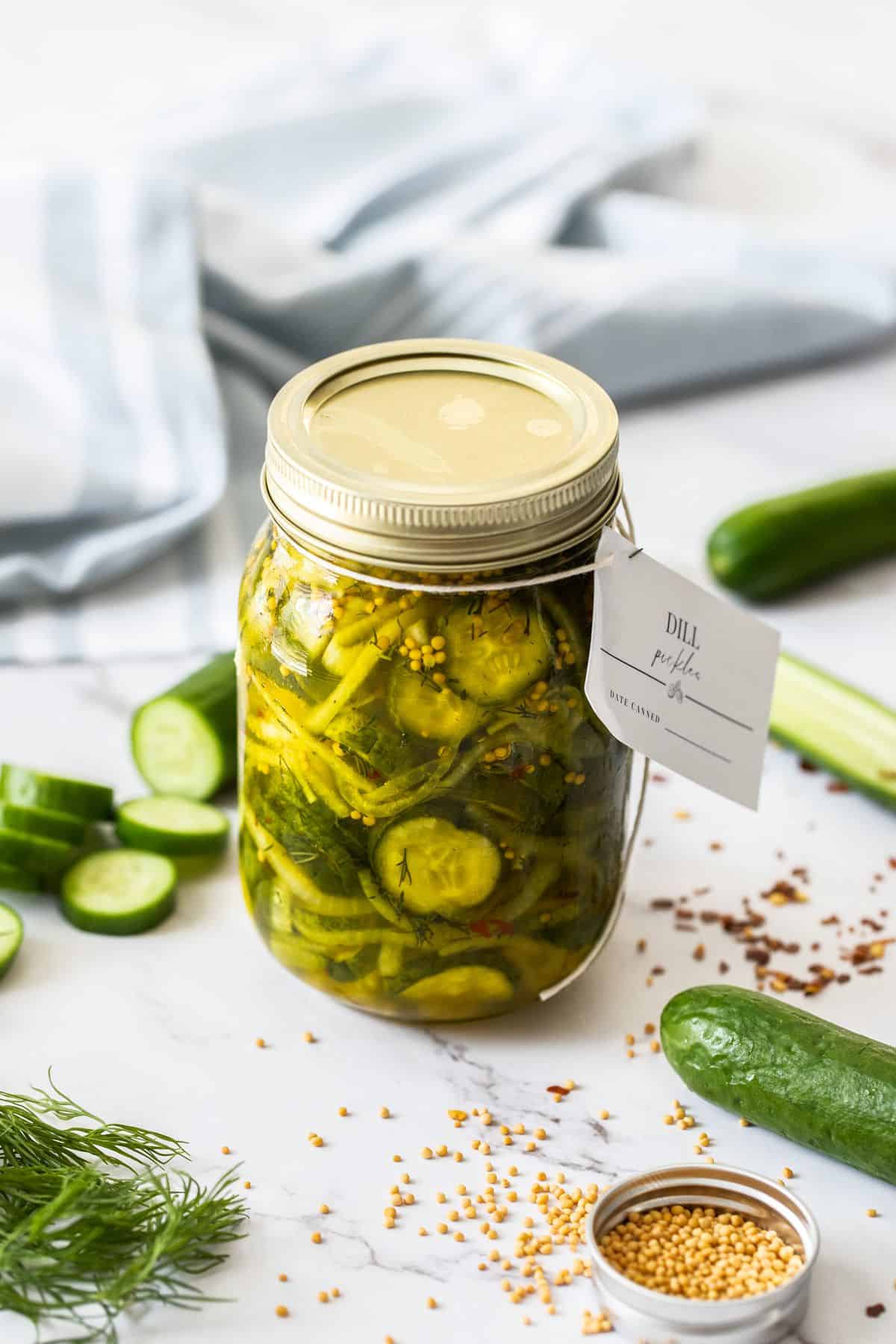
Tips for success and FAQs:
When making your own pickles and preserves, always ensure you sterilise the jars you will store them in. This is very simple to do, and I have given full details in the recipe. As well, I recommend that you use a jar with a wide opening to make it easier to fill with the pickles.
You will get the best result by using good quality ingredients. I have used Lebanese cucumbers, also known as Persian cucumbers They are a small variety, which has crisp, sweet fruit with thin, edible skin and few seeds. When selecting cucumbers, look for those with firm, unblemished skin and avoid any which feel soft.
Stored in the fridge, the pickles will last for about 3-4 months. They are best consumed within the first three months for the best texture and taste. The longer you keep the pickles, the softer they will become.
For a clear flavour, I have used white vinegar with an acidity of 5 %. You can use white wine vinegar or apple cider vinegar if you prefer.
Cucumbers contain approximately 95% water, and that water can dilute your pickling solution, so we salt them to draw out some moisture. This helps keep them crisp and concentrate their flavour. As well, I like to use small cucumbers as their water content is a little lower.
The single most important tip is to use small, firm, fresh cucumbers. If you grow your own, you have a head start. Otherwise, look for the best that you can find. But never use soft, spongey cucumbers.
Variations and substitutions:
Cucumbers - I have used this recipe to successfully pickle young, small zucchini.
Yellow mustard seeds - you can use brown if that's what you have on hand.
Dried chilli flakes - if you prefer to have less spice, you could add some whole peppercorns.
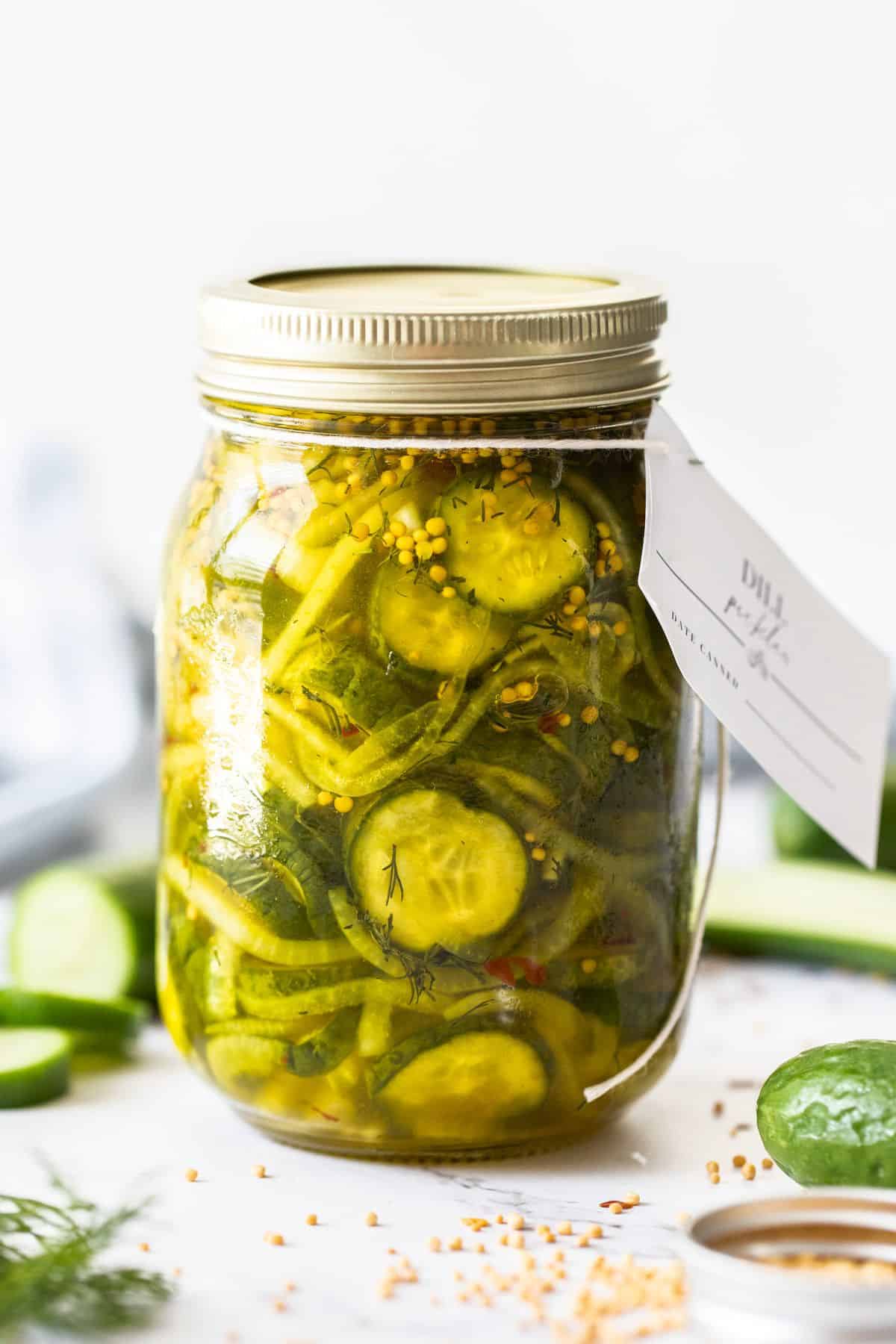
Serving suggestions:
You will find many ways in which to enjoy the Cucumber Dill Pickles. Some suggestions are:
- In a hamburger.
- For bright flavour in a sandwich.
- To balance the richness of salmon.
- With bread and matured cheese.
- To accompany cold roast meats.
- Give a jar as a gift. You can even print out your own label, as seen in the photos! Simply right-click and save the image below to print out.
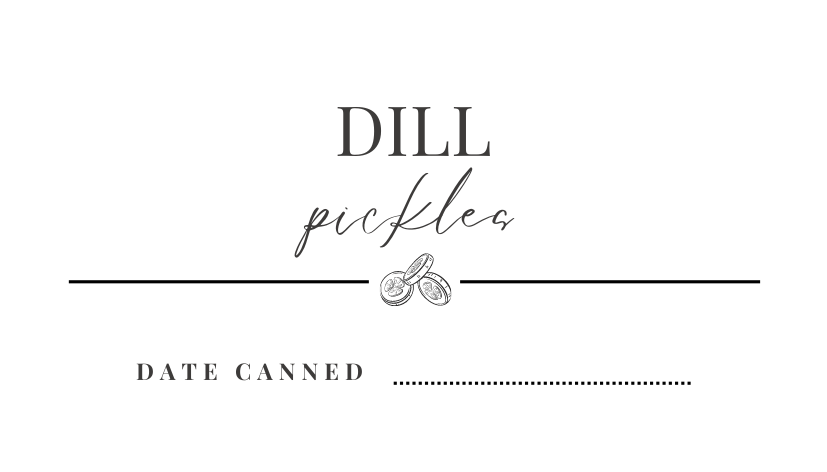
I do hope that you enjoy these quick and easy Homemade Cucumber Dill Pickles. Be sure to let me know in the comments below when you have tried them.
Alex xx
More delicious recipes for you to try:
Stay in touch!
Follow me on Facebook, Pinterest and Instagram and subscribe to my newsletter.
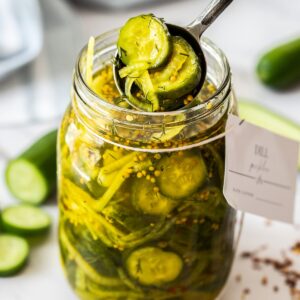
Cucumber Dill Pickles
Please note:
For accuracy, when weights are provided, we recommend weighing your ingredients. This will produce the best results. All oven temperatures listed are for fan forced.
Ingredients
- 400 g (14 oz) baby/pickling cucumbers - I use Lebanese Cucumbers See Note 1
- 1 medium brown/yellow onion
- 1 ½ tablespoon coarse sea salt See Notes 2 and 3
- 1 cup (250 ml) white vinegar See Note 4
- ¾ cup (165 g) sugar
- 2 teaspoon whole yellow mustard seeds
- ¼ teaspoon ground turmeric
- ¼ teaspoon red chilli pepper flakes
- 2 tablespoon fresh dill - finely chopped
Instructions
To Sterilise the Jars:
- Sterilise the jar or jars you'll be using to store the pickles. Choose glass jars with an airtight, metal lid and ensure they have been washed by hand in hot soapy water then rinsed well. Check that the metal lids do not have rubber inserts - if they do, allow them to air dry, instead of placing in the oven.Preheat the oven to 130 Degrees C (270 F) and place the jars in the oven for 15-20 minutes. Keep the jars warm.
For the Cucumber Dill Pickles:
- Wash and dry the cucumbers. Remove the top and end.Thinly slice – approximately ½ cm (⅕ inch) thick.
- Peel the onion and remove the tip. Cut the onion in half, and thinly slice into half moons. Discard the root end.
- In a large bowl, add the cucumbers, onion and salt. Cover the bowl with plastic wrap, and place in the fridge for 4 hours.
- Tip the cucumbers and onions into a colander and drain the excess liquid. Discard the liquid.Place the cucumber and onion slices into the warm, sterilised jar, along with the fresh dill.
- In a non-reactive saucepan (See Note 5), place the vinegar, sugar, red chilli pepper flakes, ground turmeric and mustard seeds.On a medium heat, stir to dissolve the sugar.Once the sugar is dissolved, simmer the liquid for 2 minutes.
- Remove the saucepan from the heat, and carefully pour the pickling liquid into the jar with the cucumber, onions and dill.
- Seal the jar immediately, and allow to cool on the bench before placing in the refrigerator. The Cucumber Dill Pickles can be enjoyed once cool, but I recommend leaving them for 24-48 hours to allow the flavours to develop
Video
Notes
- Cucumbers: I have used baby Lebanese Cucumbers in this recipe. Baby/pickling cucumbers are best to use for their size and crispness.
- Coarse sea salt: ensure you use cooking salt or coarse sea salt. Regular table salt may contain anti-caking agents and is much stronger.
- Tablespoon: we use a standard Australian tablespoon which is 20 ml (4 teaspoons).
- Vinegar: I have used white vinegar that is 5% in acidity. You can also use apple cider or white wine vinegar - just ensure the acidity level is 5%.
- Non-reactive saucepans: are those which are ceramic, stainless steel, glass or enamelled cookware. Copper, iron and aluminium pans are reactive. Acidic foods, such as lemons or vinegar, may take on a metallic taste and discolour if cooked in such pans.
- Storage: once the jars have cooled, store the pickles in the fridge for up to three months. This is a quick pickle recipe not designed for long term canning.
- Nutritional information: is based on the entire jar, and includes the pickling liquid.
Nutrition Estimate:
Nutritional Disclaimer:
The nutritional information is an estimate only, and is derived from online calculators. For accurate results, we recommend calculating the nutritional information based on the ingredients and brands you use.
This post was originally published in October 2018. It has been updated with new photos and more information. Minor improvements have been made to the recipe.

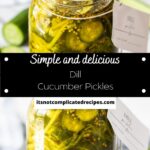
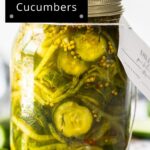
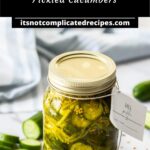
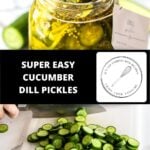
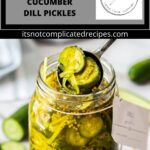
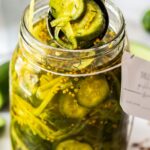
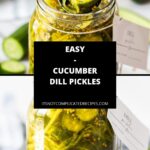
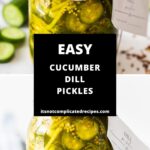
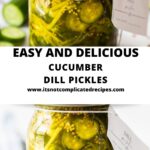
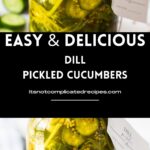
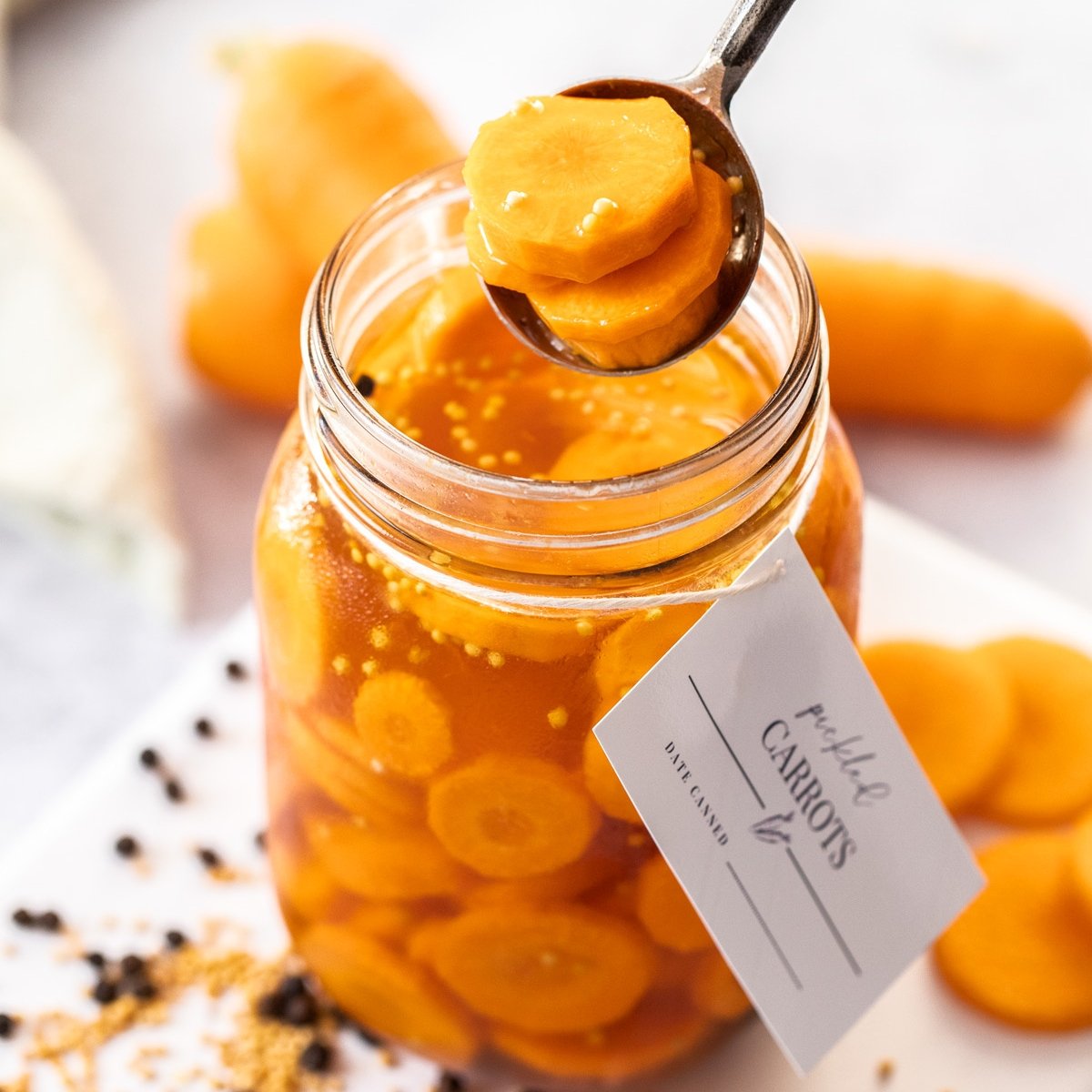
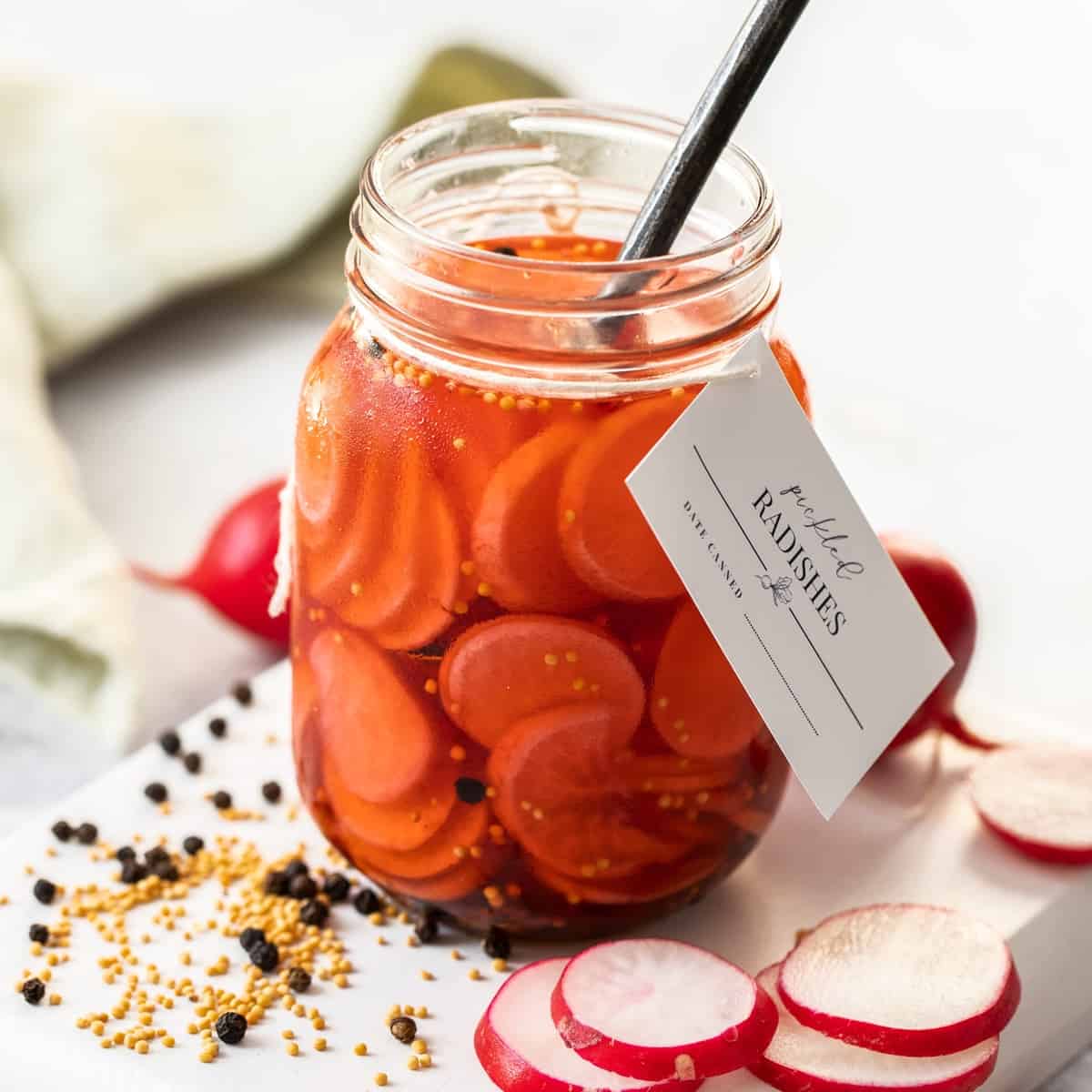
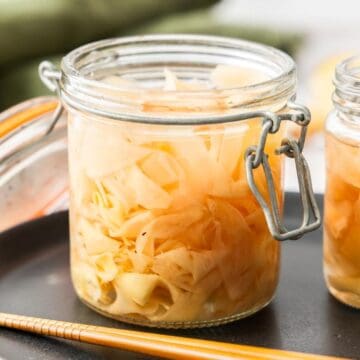
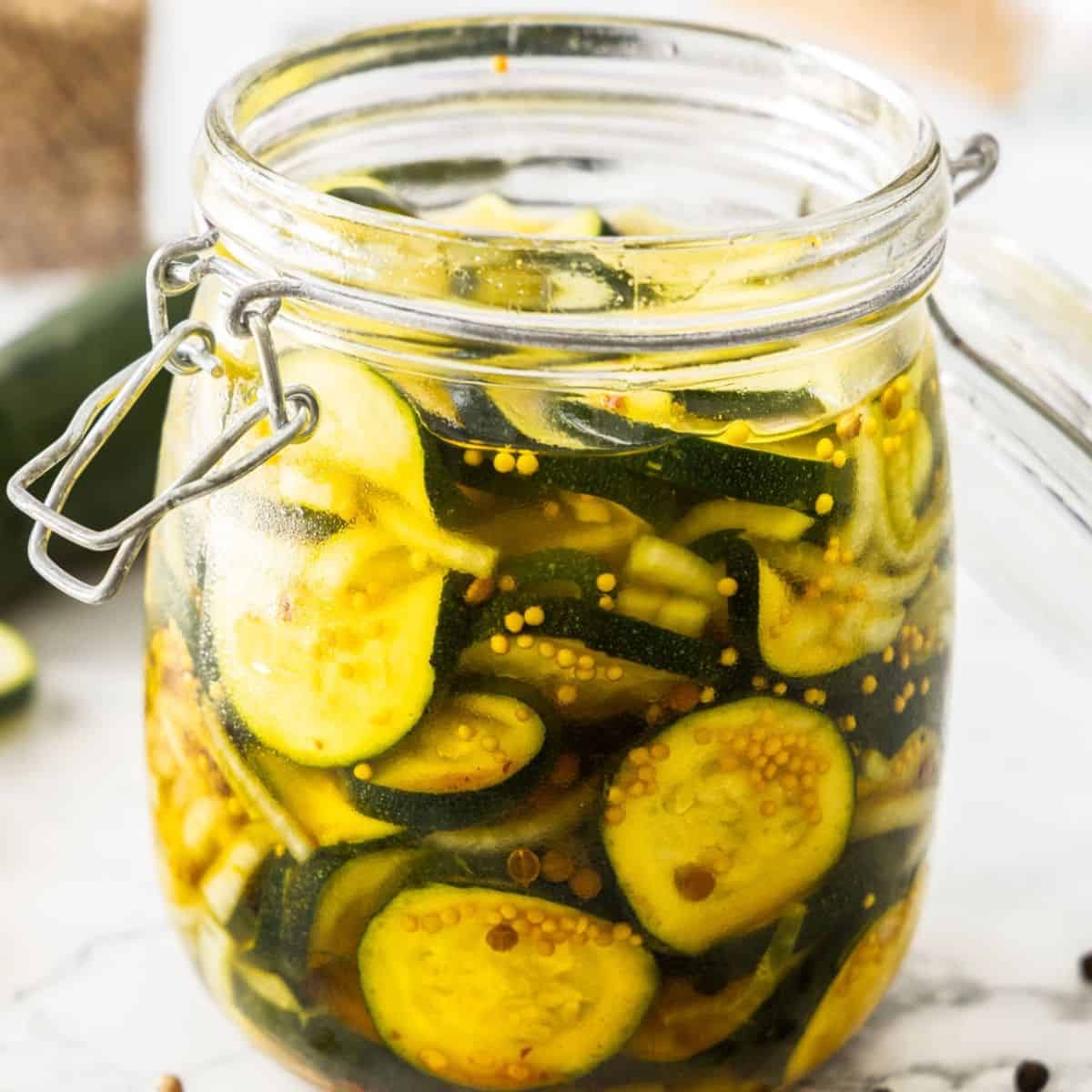
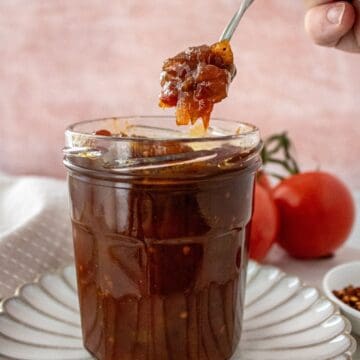
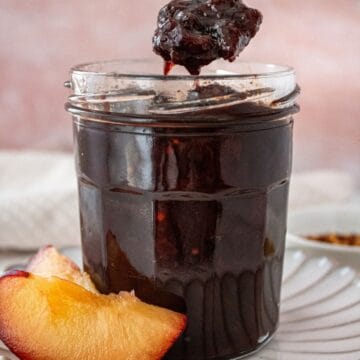
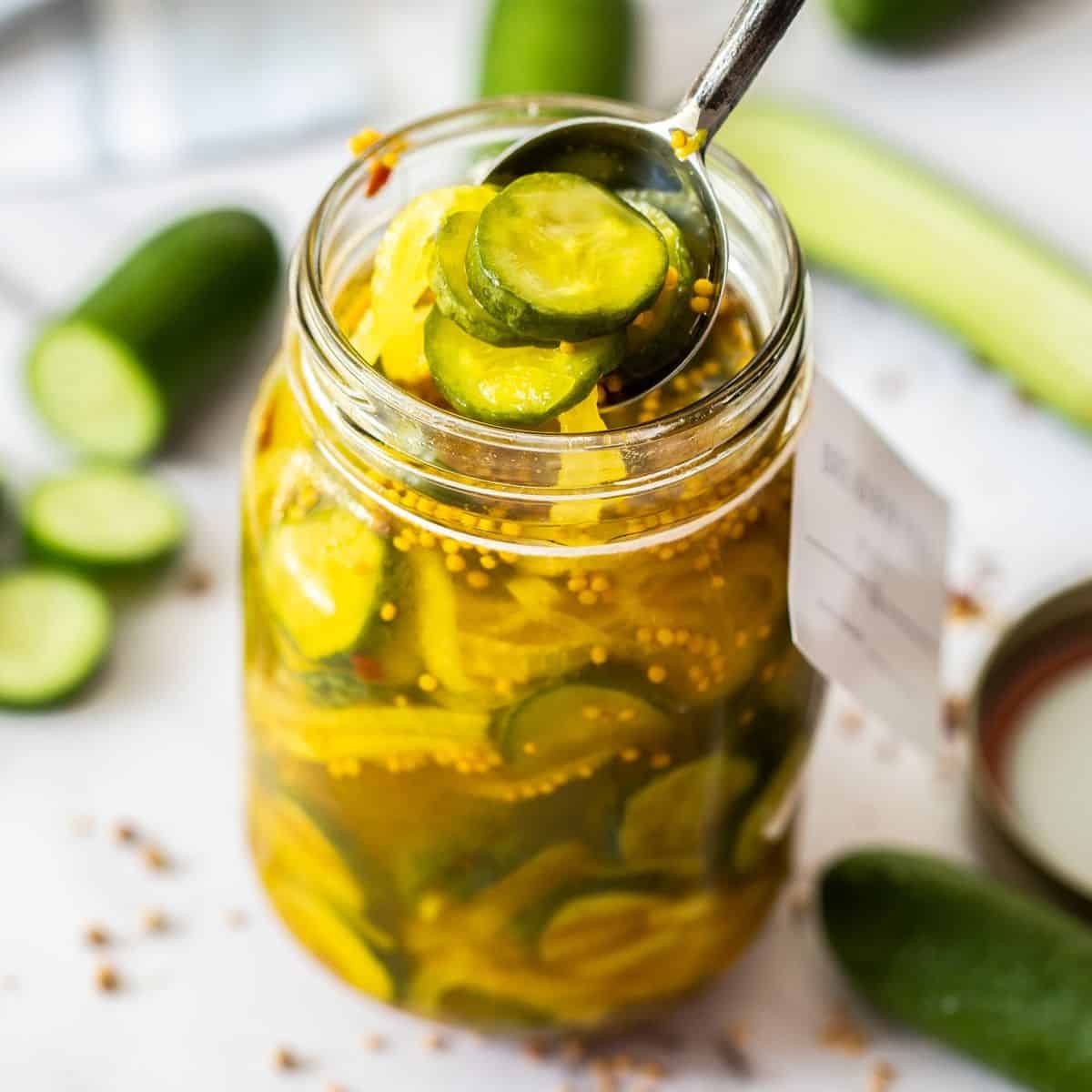
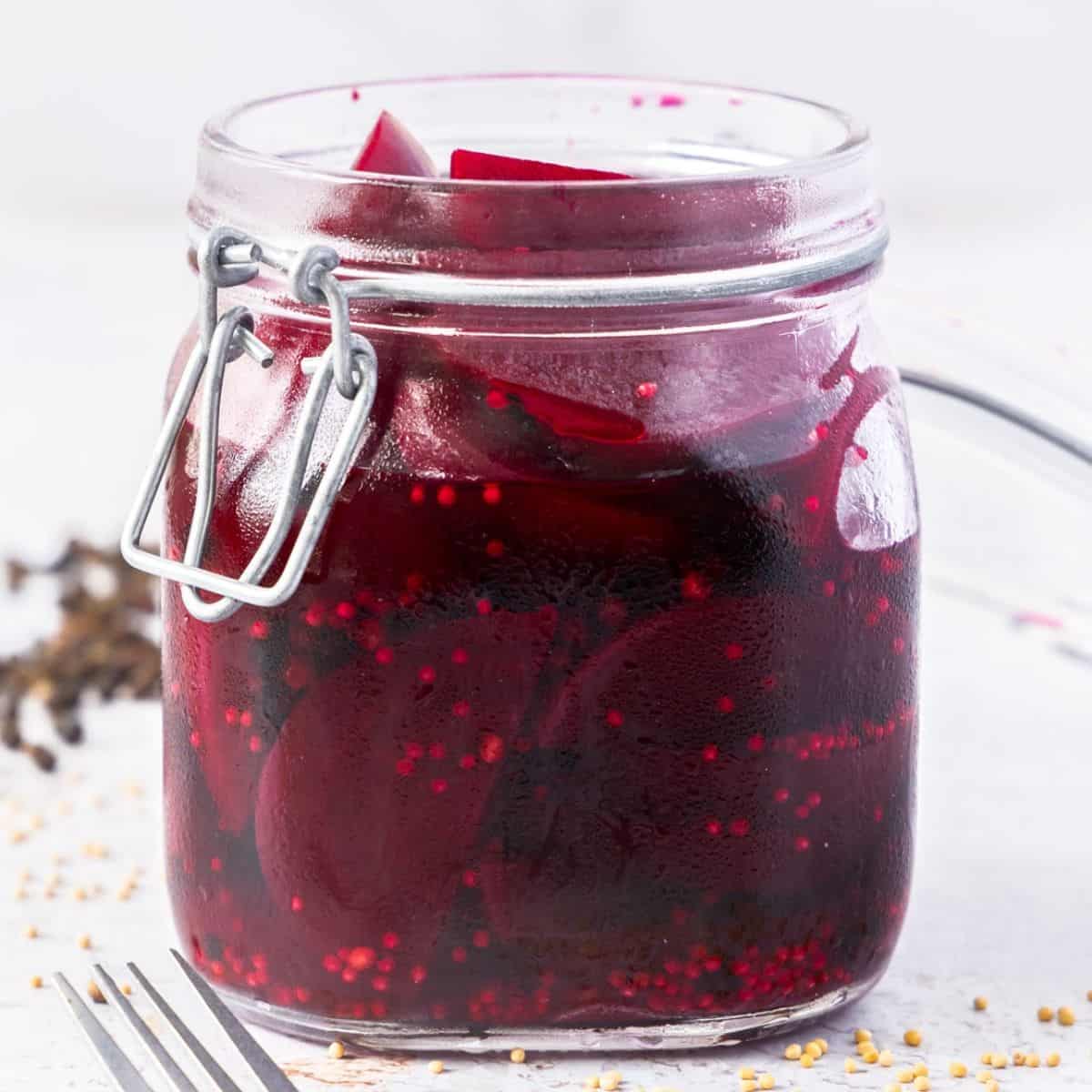
Lex says
The most delicious recipe I've used by far, and I've pickled a lot of cucumbers this season. Full of flavour and not difficult. I decided to double the ingredients at one point in order to process more cucumbers, but I'd advise against it as its impossible to divide the spices equally when pouring the pickle liquid into the jars. Stick to one batch at a time. Honestly so tasty and will disappear fast.
Alexandra Cook says
Thank you so much, Lex 🙂
Your comment has absolutely made my day!
Alex xo
Samantha Chandler says
Can I soak the cucumbers and onion in the salt overnight in the fridge or is that too long. Thanks
Alexandra Cook says
Hi Samantha,
I haven't tried this, but would worry it would be too long. We want to draw the excess moisture out of the cucumber, but leaving overnight might draw out too much and also make them extra salty.
I have left them about an hour longer than I say in the recipe and also about an hour less, with no issues.
Let me know if you give the recipe a try 🙂 Alex xo
Aprile D Fortin says
been using this recipe I for three seasons now, love it!!
Alexandra Cook says
So happy to hear this! Thank you! Alex xo
Kaz Smith says
I'm about to make this recipe for a second time. This was the first time I've tried to make my own, usually buying store bought. I will never ever ever buy them premade again. We were eating them straight from the jar lol
Alexandra Cook says
Thanks so much, Kaz 🙂 This makes me so happy to hear!
Alex xo
Natasha nasseri says
Wow Alexandra you're a real pro! You have the expertise to make sure it turns out right and you know your ingredients so as to be able to vary the recipe. I'm so impressed as a novice to making cucumber pickle. i saw some other simpler recipes but i'll be going for yours. might even add couple items to make it an interesting topping.
Alexandra Cook says
Thanks, Natasha 🙂
I hope you'll enjoy the pickles. You'll find lots more pickle recipes on the blog to try too!
Alex xo
Cathy sewell says
Can I water bath this recipe? If so for how long for pints?
Alexandra Cook says
Hi Cathy,
Please see the notes on storage:
Once the jars have cooled, store the pickles in the fridge for up to three months. This is a quick pickle recipe not designed for long term canning.
Many thanks, Alex
MO BROSCH says
Thank you for this excellent recipe. I have tried many ways to pickle/ preserve my mini cucumbers grown in my greenhouse here in Nottingham - none have been as fabulous as these! So delicious- they don’t last a week!! I use cider vinegar and fresh dill ( including flowers and seeds) from the garden. I think the secret is in the brining for 4 hrs only. Genius!
Alexandra Cook says
Thank you so much for giving the recipe a try, and I am so glad you were so happy with the result 🙂
Appreciate you taking the time to leave a comment!
Alex xo
Anne Hanley says
I made these pickles and added more chilli and some garlic and they’re really yummy.
Thanks so much for the recipe it’s great. I’m about to start on the 3rd lot of the pickle but will probably be the last lot as our vines are just about finished for this year. They’ve all been used up though.😊
Alexandra Cook says
Hello Anne,
Thanks so much for making this recipe several times! 🙂 And with homegrown cucumbers, the best!
Appreciate your comment. Alex xo
Faye says
Made these from homegrown cucumbers and they’re so delicious!!!!
Alexandra Cook says
Hi Faye,
I am so glad you enjoyed this recipe 🙂 Thanks so much for letting me know! Alex xo
Samantha says
Can I reduce the amount of sugar? My husband does not like sweet pickles at all. I’ve tried other dill pickle recipes and they all have a slightly sweet flavor.
Alexandra Cook says
Hi Samantha,
You could certainly give it a try - I haven't made it with less sugar as I follow a family recipe.
The only issue I could see is not having the brine balanced - the vinegar/salt may be more pronounced etc. That may be more to your taste though.
If you do try it, we'd love to hear how you get on! Alex xo
Richard says
These are lovely. Just had some on my burger but I was eating them while the burgers were cooking. Will do these again
Alexandra Cook says
Hi Richard,
That's great to hear. They're delicious with a burger, aren't they?
I am so glad you'll make this recipe again 🙂 Thanks, Alex
Marilyne Gayte says
The reciepe looks amazing and I would like to try. Do you think it would work as well if I leave the cucumbers whole? We usually by them whole because we just snack on them. Would the brine step work as well?
Thanks heaps! Love your blog!
Alexandra says
Hi Marilyne!
I haven’t tried using whole cucumbers but I can’t think of a reason why they wouldn’t work. Some Lebanese cucumbers can be quite large so it would be best to use smaller ones and pack them tightly in the jar.
They would not be ready for eating as quickly as the slices. I suggest leaving them for a week before trying them.
Please let me know how you get on.
I am so glad you are enjoying the blog 🙂 Kind regards, Alex
Mike says
Hi. Do you rinse the mix before pickling? I did this for a relish recipe to remove the salt! Thanks
Alexandra says
Hi Mike, no, we don't rinse the cucumbers. We drain off the salt and water brine, then press on the cucumbers to remove as much liquid as possible. As the salt is dissolved in water a lot of it is drained off, there is no need to rinse them. I look forward to hearing if you make the pickled cucumbers. 🙂
Paul says
These turned out excellently!!!
Alexandra says
Thanks for letting me know Paul. 🙂
Owen G. says
These are great pickles!
Alexandra says
Thank you, Owen!
Sara Welch says
These homemade pickles are delicious.
Alexandra says
Oh that is nice, Sara 🙂 Thank you.